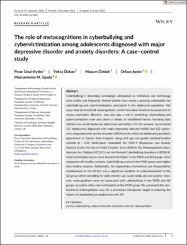| dc.contributor.author | Ünal Aydın, Pınar | |
| dc.contributor.author | Özkan, Yekta | |
| dc.contributor.author | Öztürk, Masum | |
| dc.contributor.author | Aydın, Orkun | |
| dc.contributor.author | Spada, Marcantonio M. | |
| dc.date.accessioned | 2023-05-02T07:04:22Z | |
| dc.date.available | 2023-05-02T07:04:22Z | |
| dc.date.issued | 2023 | en_US |
| dc.identifier.citation | Ünal‐Aydın, P., Özkan, Y., Öztürk, M., Aydın, O., & Spada, M. M. (2023). The role of metacognitions in cyberbullying and cybervictimization among adolescents diagnosed with Major Depressive Disorder and Anxiety Disorders: A case‐control study. Clinical Psychology & Psychotherapy. | en_US |
| dc.identifier.issn | 1099-0879 | |
| dc.identifier.uri | https://dx.doi.org/10.1002/cpp.2826. | |
| dc.identifier.uri | https://hdl.handle.net/20.500.12933/1494 | |
| dc.description.abstract | Cyberbullying is becoming increasingly widespread as individuals use technology more widely and frequently. Recent studies have shown a growing vulnerability for cyberbullying and cybervictimization, particularly in the adolescent population. We argue that dysfunctional metacognitions, which have been found to be prominent in various psychiatric disorders, may also play a role in predicting cyberbullying and cybervictimization over and above a variety of established factors including daily Internet use, social media use, depression and anxiety. For this purpose, we recruited 121 adolescents diagnosed with major depressive disorder (MDD) and 122 adolescents diagnosed with anxiety disorders (AD) from the child and adolescent psychiatric department of 'Çankırı State Hospital' along with age and gender matched healthy controls (n = 120). Participants completed the DSM-5 Depression and Anxiety Severity Scales, the Social Media Disorder Scale (SMDS), the Metacognitions Questionnaire for Children (MCQ-C) and the Revised Cyberbullying Inventory-II (RCBI-II). Cybervictimization scores were found to be higher in the MDD and AD groups when compared with healthy controls. Cyberbullying scores in the MDD group were higher than healthy controls. Additionally, the Superstition, Punishment and Responsibility subdimension of the MCQ-C was a significant predictor of cybervictimization in the AD group while controlling for daily Internet use, social media use and anxiety. However, metacognitions were not associated with cyberbullying in the MDD and AD groups, as well as with cybervictimization in the MDD group. We concluded that dysfunctional metacognitions may be a preventive therapeutic target in reducing the impact of cyberbullying in adolescents with AD. | en_US |
| dc.language.iso | eng | en_US |
| dc.publisher | John Wiley & Sons | en_US |
| dc.relation.isversionof | 10.1002/cpp.2826. | en_US |
| dc.rights | info:eu-repo/semantics/embargoedAccess | en_US |
| dc.subject | Anxiety | en_US |
| dc.subject | Cyberbullying | en_US |
| dc.subject | Cybervictimization | en_US |
| dc.subject | Depression | en_US |
| dc.subject | İnternet | en_US |
| dc.subject | Metacognitions | en_US |
| dc.title | The role of metacognitions in cyberbullying and cybervictimization among adolescents diagnosed with major depressive disorder and anxiety disorders: A case-control study | en_US |
| dc.type | article | en_US |
| dc.authorid | 0000-0003-4627-1204 | en_US |
| dc.department | AFSÜ, Tıp Fakültesi, Dahili Tıp Bilimleri Bölümü, Çocuk ve Ergen Ruh Sağlığı ve Hastalıkları Ana Bilim Dalı | en_US |
| dc.contributor.institutionauthor | Özkan, Yekta | |
| dc.relation.journal | Clinical Psychology & Psychotherapy | en_US |
| dc.relation.publicationcategory | Makale - Ulusal Hakemli Dergi - Kurum Öğretim Elemanı | en_US |
















